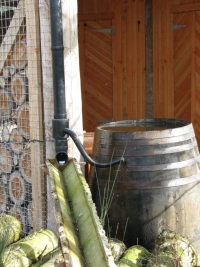Poll results highlight public concern water issues
A new UK-wide opinion poll, commissioned by WWT, highlights growing awareness and concern about water usage and a willingness to do more to reduce flooding and help wildlife. WWT is using the survey to launch a campaign to raise awareness of how we can manage rainwater better for communities, whilst benefitting wildlife and making financial savings.
The results highlight simple ways all of us can do more to reduce the impact of too much or too little rain, and how public bodies and private companies can help too.

One of the most heartening results is how many people interviewed were willing to make water-friendly adaptations to their homes and gardens. Over 40% have, or would consider having, a pond filled with rainwater and nearly as many would consider a green roof. Just under half have, or would consider putting in, a swale or ditch with water-loving plants to allow rainwater to soak away slowly. And three quarters of us have, or would have, a water butt.
Across the board there was an increase in concern over issues relating to water. Highest on the list was reducing water bills but flooding, environmental damage to wetlands from polluted storm-water run-off and shortages of water for wildlife in gardens and public spaces were all also concerns.

Wildlife pond with water butt (photo: WWT).
Survey highlights
- Over 52% of interviewees who did not have a water butt said they had not been offered a subsidised water butt by their council or water company — only 5% said they had.
- 32% had water butts, and of those 59% used the water for watering plants or vegetables with almost 5% saying that, although they had a water butt, they didn't really use it. Other uses included washing the car, topping up the pond, washing pets and flushing the toilet.
- 41% either have or would consider a pond.
- 37% would consider a green roof.
- 25% would consider creating a small wetland or boggy area in their garden.
Martin Spray continued: "The environmental advantages of conserving water are multiple and it is clear that people are keen to do their bit. This survey has thrown up simple measures that we can do at home and that our institutions can do to support us."
The WWT website has several instructive videos on how to turn your garden into a 'Rain Garden' and how to make your garden more wildlife-friendly.
Also, opening today [22nd March] is a competition to find the most comprehensive use of a water butt to conserve water. Work Your Butt is open until 30th June and every accepted entry will be given a free admission to the WWT centre of their choice and there are hundreds of pounds worth of gardening vouchers to be won. Entrants simply need to complete one of two sentences: "I work my butt well by..." or "If I had one, I would work my butt by..." and submit a photo or upload a video.
The public can also contribute their own experiences and thoughts on using water. WWT is asking the nation to go online and spend just five minutes completing a survey.
Fast facts
- On hot summer days, 70% of the UK's domestic water supply may be used to water gardens.
- If every household in the UK got a standard water butt (and worked it), this would save about 30,000 million litres of water each summer — enough to fill approximately 12,000 Olympic swimming pools.
- A standard household roof collects enough rainwater to fill 450 water butts every year.
- Rainwater collected in a water butt is much better for both ponds and gardens than treated tap water.
- In a big storm, the rapid movement of water off hard surfaces into the drainage system is a major factor in flooding — drains fail to cope with the volume of water and overflow, flooding property and threatening lives. Two 250-litre or four 125-litre water butts store enough water to cope with the first 1 cm of rainfall off a small roof — equivalent to a moderate summer rainstorm.

